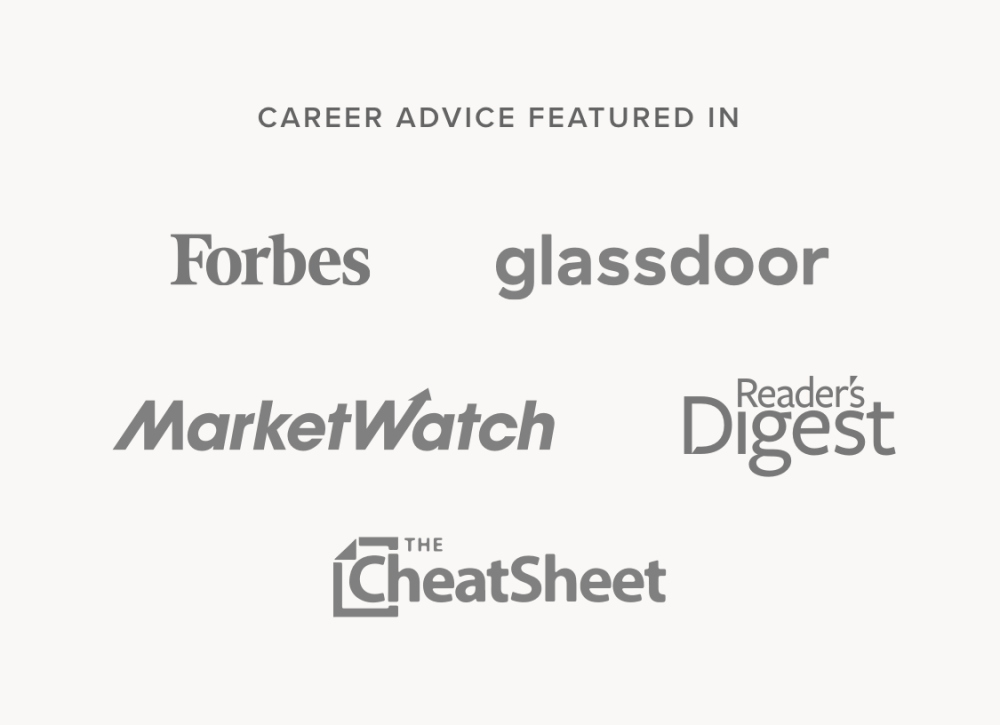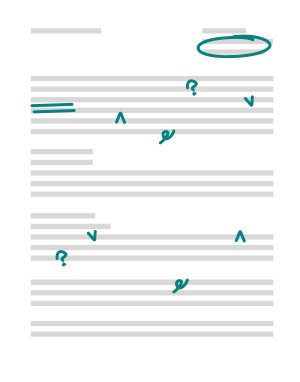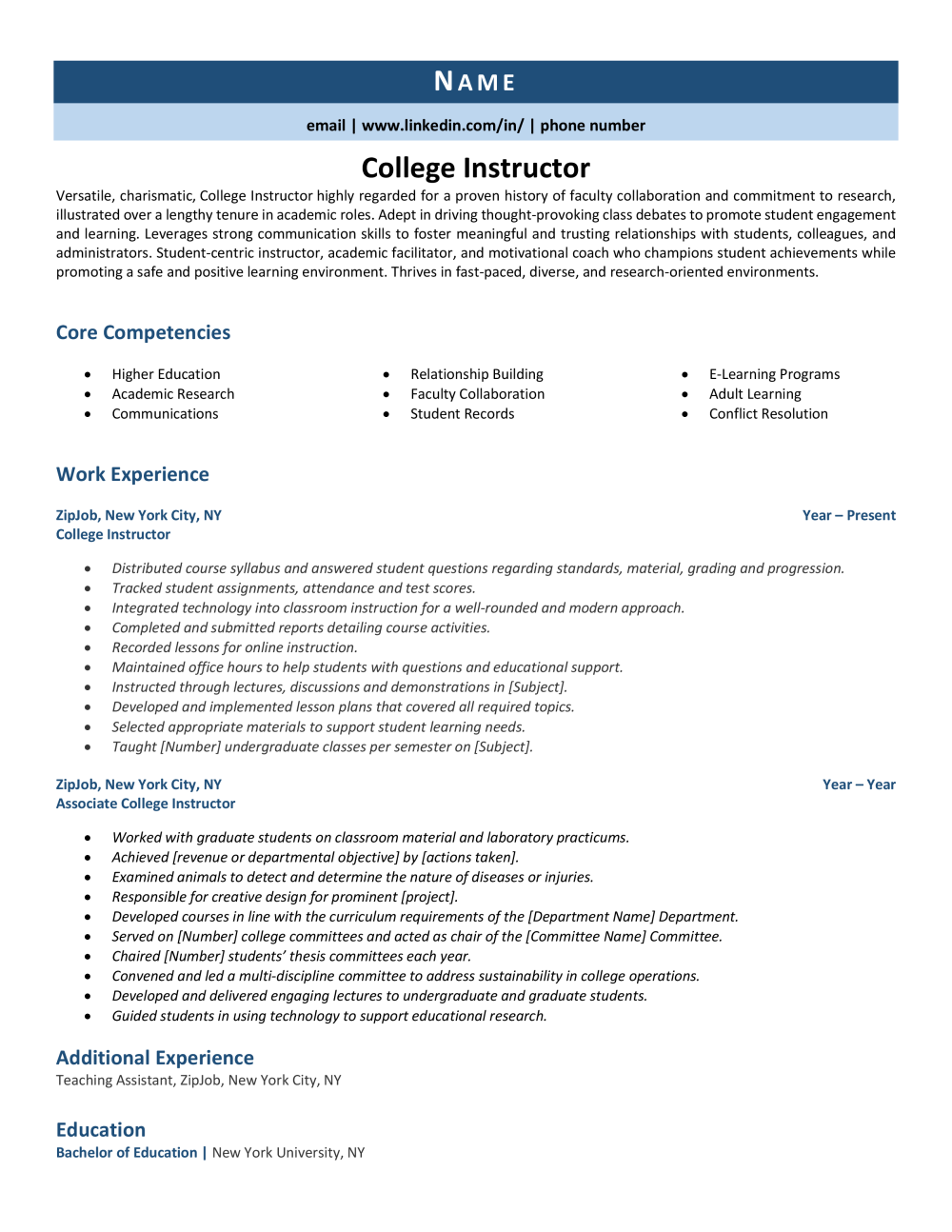Samples › College Instructor
College Instructor Sample
Download and customize our resume template to land more interviews. Review our writing tips to learn everything you need to know for putting together the perfect resume.


A College Instructor teaches in a specialty to college students. Below is a general job description:
Teachers at colleges and universities (unknown type) serve as leaders and instructors for a wide variety of students. They must develop lesson plans and deliver lectures and lessons to their students. When not instructing, their days (and often evenings) consist of grading and reviewing papers, exams, and tests. They may also use their time outside of class for research and other academic work. Teachers at colleges and universities work with other instructors on committees, research, and brainstorming teaching techniques as well.
If this is the kind of job you want or you have, you’re in the right place! We have a resume example for you and tips from our professional resume writers below.
Related titles:
Expert Tip
You should never use a creative resume
Many job seekers think that an eye-catching resume template will help them stand out to hiring managers and increase their chances of landing an interview. This is a myth put out by resume builders that value design over content.
The truth is that most hiring managers prefer a traditional resume format.
Creative resume templates, like the one pictured here, can actually hurt your chances of landing an interview. Instead, you should use a basic resume format that quickly communicates your basic information and qualifications–like the one included below.
College Instructor resume (text format)
How confident are you feeling about your resume? If you need more help, you can always refer to the following resume sample for a position.
Name
City, State or Country if international
Phone | Email
LinkedIn URL
COLLEGE INSTRUCTOR PROFESSIONAL
Versatile, charismatic, College Instructor highly regarded for a proven history of faculty collaboration and commitment to research, illustrated over a lengthy tenure in academic roles. Adept in driving thought-provoking class debates to promote student engagement and learning. Leverages strong communication skills to foster meaningful and trusting relationships with students, colleagues, and administrators. Student-centric instructor, academic facilitator, and motivational coach who champions student achievements while promoting a safe and positive learning environment. Thrives in fast-paced, diverse, and research-oriented environments.
CORE COMPETENCIES
Higher Education
Academic Research
Communications
Relationship Building
Faculty Collaboration
Student Records
E-Learning Programs
Adult Learning
Conflict Resolution
PROFESSIONAL EXPERIENCE
ZipJob, New York City, NY | Year – PresentCollege Instructor
Distributed course syllabus and answered student questions regarding standards, material, grading and progression.
Tracked student assignments, attendance and test scores.
Integrated technology into classroom instruction for a well-rounded and modern approach.
Completed and submitted reports detailing course activities.
Recorded lessons for online instruction.
Maintained office hours to help students with questions and educational support.
Instructed through lectures, discussions and demonstrations in [Subject].
Developed and implemented lesson plans that covered all required topics.
Selected appropriate materials to support student learning needs.
Taught [Number] undergraduate classes per semester on [Subject].
ZipJob, New York City, NY | Year – YearAssociate College Instructor
Worked with graduate students on classroom material and laboratory practicums.
Achieved [revenue or departmental objective] by [actions taken].
Examined animals to detect and determine the nature of diseases or injuries.
Responsible for creative design for prominent [project].
Developed courses in line with the curriculum requirements of the [Department Name] Department.
Served on [Number] college committees and acted as chair of the [Committee Name] Committee.
Chaired [Number] students’ thesis committees each year.
Convened and led a multi-discipline committee to address sustainability in college operations.
Developed and delivered engaging lectures to undergraduate and graduate students.
Guided students in using technology to support educational research.
EDUCATION
Complete School Name, City, St/Country: List Graduation Years If Within the Last Ten Years
Complete Degree Name (Candidate) – Major (GPA: List if over 3.3)
Relevant Coursework: List coursework taken (even include those you are planning on taking)
Awards/Honors:
List any awards, honors or big achievements
Clubs/Activities: List clubs and activities in which you participated
Relevant Projects: List 2-3 projects you have worked on
Everything you need to write your college instructor resume
Now that you’ve seen an example of a job winning College Instructor resume, here are some tips to help you write your own. You should always begin with a summary section. Remember to use basic formatting with clear section headings and a traditional layout. Finally, be sure to include top skills throughout your resume. We’ve included several examples common for College Instructor below.
Let’s start with your resume summary section.
1. Summary
The resume summary replaces the out-of-date resume objective. A summary outlines the most impressive parts of your resume for easy recall by your potential employer, while also serving to fill in personal qualities that may not appear elsewhere on the page. Remember that summaries are short and consist of pithy sentence fragments! You can check out the Lawyer resume example for more information!
Expert Tip
Always start with your most recent positions at the top of your resume. This is called reverse-chronological format, and keeps your most relevant information easy for hiring managers to review.
2. Formatting
Our experts recommend you start your resume with a resume summary, like the one above. Other common sections are Work Experience, Education, and either Skills or Core Competencies. Here are some guides from our blog to help you write these sections:
Some resumes will include other sections, such as Volunteer Experience or Technical Skills. When it comes to what sections you need to include on your resume, you will know best!
Other sections for you to consider including are foreign language skills, awards and honors, certifications, and speaking engagements. These could all be relevant sections for your resume.

Join more than 1 million people who have already received our complimentary resume review.
In 48 hours, you will know how your resume compares. We’ll show you what’s working--and what you should fix.
3. Appropriate skills
1. Maximize your core competencies
Your core competencies, or key skills, are a powerful way to show an ATS scan that you’re a great applicant. This section should change slightly for almost every job you apply for. You want to keep it highly tailored to the job description. For example, if one of your core competencies is customer service but the job description is looking for client communication skills, swap out “customer service” for “client communication.”
To identify the best skills to highlight here, this list of 10 vital skills to put on your resume is a good starting point.
2. Keep your skills relevant
As you could see from the job description, there are many kinds of professionals in this field. When updating your own resume, you’ll want to make sure your experience is as relevant as possible. The best way to do this is to have a clear career target. Then, write your resume with that goal in mind.
ZipTip: Give every line a second look and think “would an employer care about this experience?” If the answer is no, take it off your resume!
4. Experience section
Your Work Experience section should make up the bulk of your resume. This section should include your relevant job titles, companies that employed you, and the dates you were employed.
Most people will finish this section by listing daily duties in short bullet points. Don’t be one of them!
To make your resume stand out, you need to add your accomplishments and key skills to your resume’s Work Experience section.
Here are three tips from our experts:
Use the
to describe a situation, task, action, and result. This is adapted from a behavioral interview technique, so interviewers will recognize the format. it’s also a great chance for you to organize your key accomplishments.
Don’t forget about LinkedIn! The majority of employers are going to look you up on LinkedIn, so it’s smart to make sure your LInkedIn profile is up to date and
in your resume’s contact section.
Always include a cover letter. Not everyone will bother, so it helps you look like a serious job applicant. It’s also your chance to introduce yourself: who you are, why you’re applying for this job, and how you want to proceed.
Let’s wrap it up!
Standout resumes will include a resume summary, a traditional reverse-chronological layout, and the skills and experience relevant to your job target. This resume example shows how to include those elements on a page. It’s up to you to insert your personal compelling qualifications.
Keep your resume format easy to scan by both humans and computers; our resume template is designed by our experts to satisfy both audiences. And be sure to include your own skills, achievements, and experiences. Job-winning resumes are resumes that successfully market you, leading recruiters and hiring managers to want to learn more!
Finally, emphasize your interest with a customized cover letter. When writing, remember that the resume and cover letter should support each other. Check out our cover letter tips and examples for more advice.
Didn’t get the specific answers you were looking for on this page? Hire a professional resume writer to get the advice you need to land your next job.
Related posts:

